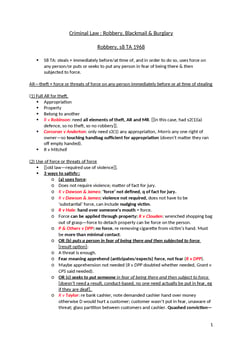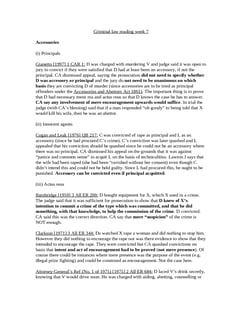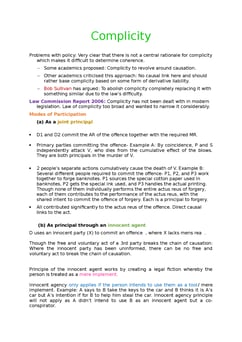Judgement for the case R v Mohan
Table Of Contents
KEY POINTS
Evidence that tends to establish directly or indirectly, by inference, that the accused knew or anticipated that the likely consequence of his actions would be the completion of the offence can be construed as proof of intent. However, in relation to the offence of attempt, such knowledge is not to be equated with intent unless it is established.
The term "intention" refers to the decision, to ensure that a specific outcome is achieved. It is thus irrelevant whether the intended result was likely to occur or not.
FACTS
A police officer on duty spotted the appellant driving a motor car, over the permitted speed limit. The officer signaled the appellant to stop, by standing in the path of the motor car. The car slowed down but when it was about 10 yards away from the officer, the appellant accelerated the car aggressively and was driving it straight at the officer, who moved out of the path to escape being hit.
-
The appellant, John Patrick Mohan, was charged on three counts:
1) he attempted to cause the officer grievous bodily harm with the intent to do so
2) While driving the motor car, he intentionally drove wantonly in an effort to cause bodily harm to the police officer, and
3) He engaged in reckless driving, in a way that was dangerous to the general public.
In the Central Criminal Court, the accused was found not guilty on count 1 but found guilty on counts 2 and 3, for which he was sentenced to 12 months of imprisonment on each count, to run concurrently. On count three, he also received a three-year driving ban.
After being held guilty on the 2 counts, the appellant filed an appeal. The appeal dealt with the meaning of intention in the context of the offence of attempting to commit a crime.
JUDGEMENT
The appeal was allowed and the appellant was acquitted from conviction on count 2.
However, punishment for the third count of reckless driving and endangering the lives of public would still stand.
COMMENTARY
In this case, the court held that, even attempting to commit a crime is a serious offence in itself. It is often just as morally wrong to attempt an offence as it is to actually commit the said offence. However, it belongs to the category of actions that are taken in advance of committing a crime and takes place before the attempted crime, and is one step removed from the actual offence.
It is a widely established legal principle that the offence of attempting to commit a crime requires the element of intent (mens rea).
The meaning of intention, when used to describe mens rea in the offence of attempt was debated over by the judges. It was referred to as a “specific intent” which was defined as “a decision to bring about a certain consequence”.
It was held that, the decision taken by the Central Criminal Court was bad in law, the criminal court judge presented a different basis for a conviction that did not and could not form the essential mens rea.
To prove the offence of attempt to commit a crime, a specific intent has to be proven, i.e., an aim or decision by the accused to bring about the commission of the offence that he was alleged to have attempted to commit. It was not enough to show that the accused knew or foresaw that the ramifications of his actions would almost certainly result in the commission of the actual offence; nor is a reckless state of mind sufficient to demonstrate the required mens rea.
Thus, the appeal was allowed and the appellant was acquitted from conviction on count 2. However, punishment for the third count of reckless driving and endangering the lives of public, would still stand.
ORIGINAL ANALYSIS
Defendant drove his car quickly when a policeman ordered him to stop. The car almost hit the policeman and Defendant was charged with attempted ABH (actual bodily harm) against the policeman.
The judge directed that Defendant had to have been at least reckless that ABH would be caused.
CA allowed appeal against Defendant’s conviction since in attempted crimes it had to be proven that Defendant intended the crime regardless of normal rules of mens rea.
For Further Study on R v Mohan

A collection of the best GDL notes the director of Oxbridge Notes (an O...

Criminal Law notes fully updated for recent exams at Oxford and Cambrid...
Need instant answers? Our AI exam tutor is here to help.
Ask questions 🙋 Get answers 📔 It's simple 👁️👄👁️
Our AI is educated by the highest scoring students across all subjects and schools. Join hundreds of your peers today.
Get StartedRelated Product Samples
These product samples contain the same concepts we cover in this case.
| GDL Criminal Law | Mens Rea Notes (9 pages) |
| Criminal Law | Mens Rea — Intention Recklessness And Negligence Notes (24 pages) |
| Criminal law | Offences Against The Person Notes Real Notes (28 pages) |

 Since 2010, Oxbridge Notes has been a trusted education marketplace, supplying high-quality materials from top achievers at universities like Oxford, Cambridge, LSE, Harvard, and Yale.
Since 2010, Oxbridge Notes has been a trusted education marketplace, supplying high-quality materials from top achievers at universities like Oxford, Cambridge, LSE, Harvard, and Yale.